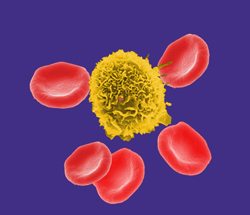Background
1. Scientists from A*STAR’s Singapore Immunology Network (SIgN) and KK Women’s and Children’s Hospital (KKH) in Singapore have discovered that a fetus’s immune system is established as early as the second trimester of pregnancy, and may be able to initiate immune responses independently of the mother’s immune system.
2. These findings debunk commonly-held assumptions about fetal immunity, including the idea that the fetus’s immune system develops much later in the pregnancy cycle, and is unable to mount an independent immune response, being dependent on the mother’s immune system to defend itself against external pathogens.
3. The scientists also found that an unborn baby’s immune system contains a unique mechanism to prevent rejection of the mother’s cells, even as it develops independently. This mechanism is mediated by dendritic cells expressing the protein Arginase-2.
4. These findings represent a landmark shift in our understanding of human immune development, and also provide insights into the immune mechanisms involved in some pregnancy-related illnesses and developmental diseases.
5. Dr Florent Ginhoux, Senior Principal Investigator at SIgN, A*STAR, and joint-senior author of the study said, “We are excited by the prospects this discovery holds for the growing field of research into fetal immunity, and the insights it provides into the very beginnings of the human immune system. Moving forward, we plan to expand our characterisation of the human fetal immune system beyond dendritic cells, to incorporate other key immune cells like B-cells or T-cells. Our eventual goal is to build an atlas of the fetal immune system. Hopefully, this will allow us to discover additional mechanisms of fetal tolerance, and identify gene signatures so that we can better evaluate fetal fitness and immunity.”
6. Associate Professor Jerry Chan, Senior Consultant, Department of Reproductive Medicine, at KK Women’s and Children’s Hospital, Singapore, and joint-senior author of the study said, “We have known for a long time that maternal cells cross into the baby’s blood stream, but are not rejected by the fetal immune system. It had been long thought that the fetal immune system does not reject these semi-foreign cells due to its immaturity. The discovery of a fully functional dendritic cell network by the second trimester of pregnancy challenges this belief, and the high expression of Arginase-2 by fetal dendritic cells may contribute to the ability of the fetus to tolerate the mother’s cells. This new insight lays the foundation for future immune-directed therapies, and contributes to our knowledge of the fetal origins of certain pregnancy-associated conditions, such as pre-eclampsia.”
7. The findings of this study have been published in the scientific journal
Nature on 14 June 2017.
Key Findings
8. Dendritic cells are immune cells that act as the sentinels of the body’s immune system. They detect and assess the threats posed by foreign pathogens to the body and decide whether to initiate an immune response.
9. A major finding of the study is that as early as the second trimester of pregnancy, the human fetus has developed a network of dendritic cells that is similar to that of mature adults. These fetal dendritic cells are able to perform key functions associated with adult dendritic cells.
10. However, the scientists also uncovered a key difference between fetal and adult dendritic cells – the former expresses high levels of a protein called Arginase-2, which dampens the immune system response. This mechanism of immunosuppression promoted by fetal dendritic cells helps to ensure that the fetus does not reject the mother’s cells even as it begins to develop its own immune defences.
11. Furthermore, Arginase-2 regulates the ability of immune cells to secrete a key inflammatory signaling protein called TNFα. This prevents the fetus’s immune system from overreacting, and initiating unwanted inflammatory immune responses that could impact the baby’s ongoing development in the womb.
12. The dysregulation of TNFα production in the fetal immune system has been implicated in various pregnancy-related conditions and developmental diseases, such as gestational diabetes mellitus, recurrent spontaneous miscarriage, and necrotising enterocolitis. Hence, in expressing Arginase-2, fetal dendritic cells play a critical role in fetal immune tolerance, and ensuring the overall healthy development of the fetus in the mother’s womb.
IMAGE:

| The image on the left depicts a human dendritic cell surrounded by red blood cells in the blood stream. A new study in Nature has found that fetuses develop a sophisticated network of dendritic cells within the second trimester of pregnancy. Fetal dendritic cells play a crucial role in ensuring an unborn baby does not reject the mother’s cells as it develops its own immune defences.
Image credit: Dr Benoit Malleret, Singapore Immunology Network (SIgN), A*STAR. |
The full text of the article can be accessed from:
http://dx.doi.org/10.1038/nature22795.
